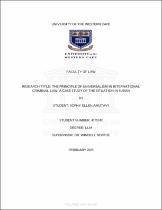The principle of universalism in international criminal law: a case study of the situation in Sudan
Abstract
This thesis aims to explore the evolution and practical application of the universal jurisdiction principle within the International Criminal Court (ICC). It will focus on the challenges presented by the reluctance and or refusal of states to enforce arrest warrants, particularly against sitting Heads of State. The research focuses on the role of universal jurisdiction in prosecuting crimes of international concern. The study delves into the establishment of the ICC in 1998 through the Rome Statute, highlighting the complementary nature of its jurisdiction with national courts. It examines the criteria for ICC intervention, considering the failure of national courts to prosecute individuals for crimes highlighted in the Rome Statute. The paper addresses the procedural aspects of ICC involvement, issuance of arrest warrants, and the surrender of suspects by states. A significant focus of the thesis is on the case of Sudan and its former President Omar Al- Bashir. Despite Sudan not being a party to the Rome Statute, the ICC gained jurisdiction through a United Nations Security Council resolution. The challenges arising from states' reluctance to enforce ICC arrest warrants, illustrated by instances like President Al- Bashir's case, are analyzed. The study also draws parallels with previous cases, such as those involving Augusto Pinochet and Hissène Habré. I will critically examine the tension between ICC's universal jurisdiction and the doctrine of head of state immunity, exploring geopolitical considerations and the role of international relations in hindering the execution of arrest warrants. The paper questions the effectiveness of ICC's universal jurisdiction in bringing sitting heads of state to trial and proposes avenues for improvement. In conclusion, the study underscores the need to reassess the efficacy of ICC's universal jurisdiction in the context of evolving diplomatic relations and geopolitical realities. The findings aim to contribute to an understanding of the challenges associated with enforcing ICC arrest warrants against high-profile individuals, and provide recommendations for enhancing the universal jurisdiction principle.

